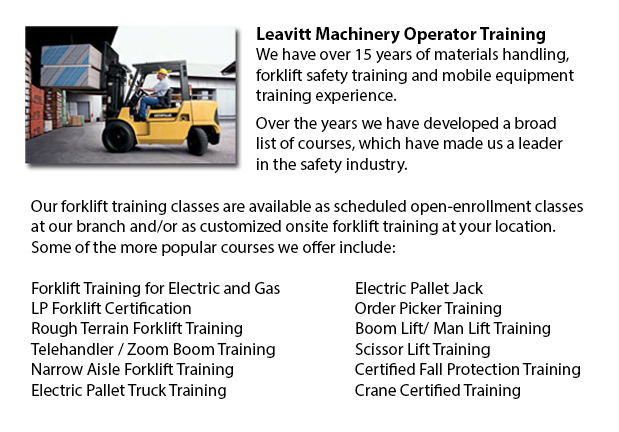
Fort Mcmurray Forklift Certification Schools - Forklift Certification is mandatory in North America. Thus, forklift training programs are essential both for businesses and for people seeking jobs in industries as operators of forklifts. Forklift training focuses on health and safety concerns included in using forklifts. Safety concerns affect both the operator of the forklift and employees and other individuals who are near the forklift. Companies can be subject to penalties if they are caught with drivers who are not certified during a check up. There are several compelling reasons why businesses should abide by forklift standards.
Before the worker or trainee is certified to operate a forklift, nearly all federal, state, and provincial rules would require the worker undergo an evaluation of the skills essential for forklift safety. There are numerous forklift certification schools offering courses for employees and there are also schools that offer online forklift training. Nonetheless, employers should be aware that forklift certification training is not "just a test". Correct forklift training should contain several fields of study, like for example theory and hands-on practice. Regulations do not require employers to have an outside organization to certify operators of forklifts.
A quality forklift certification school would include a suggested program that includes hands-on training that is performed on-site and classroom training. The training sessions within the classroom include power point presentations, videos, discussions and models. Students normally must write a test to check for comprehension of subject matter. Certificates of completion are given upon successful completion of the class.
The use of the equipment evaluation needs the trainee to understand the job site dangers, pre-operational equipment check, operational instruction and a pass/fail operational test.
The following subject areas will usually be covered in the training: Understanding legislations and regulations; Controls & Instrumentation; Engine maintenance and Operation; Steering and Maneuvering; Visibility, Fork & Attachment Restrictions; Rated Capacities, Stability, Inspection & Maintenance; Load Manipulation; Refueling; Pedestrians, and Hazardous Places & Rough Terrain Operation. Furthermore, there are training courses offered for employees who are transitioning to new job positions.
-
Fort Mcmurray Forklift Safety Training
Fort Mcmurray Forklift Safety Training - Those wanting work in industries which utilize forklifts should undergo a forklift safety training course prior to becoming a certified operator of a forklift. There are many ways to go about obtaining forklif... More -
Fort Mcmurray Heavy Equipment Training Courses
Fort Mcmurray Heavy Equipment Training Courses - The first step needed to take when choosing heavy equipment operator courses is figuring out the capacity you wish to work with heavy machinery. For instance, you could take courses that would teach yo... More -
Fort Mcmurray Wheel Loader Operator Training
Fort Mcmurray Wheel Loader Operator Training - To be able to raise significant weights, industrial cranes make use of levers and pulleys. In the past, Romans used cranes to build enormous monuments making the origin of these machines at least two tho... More -
Fort Mcmurray Telehandler Training Courses
Fort Mcmurray Telehandler Training Courses - Employers are responsible for making sure that their operating personnel and supervisors are trained to work competently using telehandler equipment. The competence level of employees need to be assessed.... More -
Fort Mcmurray Heavy Equipment Operator Certification
Fort Mcmurray Heavy Equipment Operator Certification - The person who manipulates the controls and drives various types of heavy machinery is known as a heavy equipment operator. Most commonly, this machinery is used on construction sites to be able... More -
Fort Mcmurray Forklift Ticket
Fort Mcmurray Forklift Ticket - Forklifts and the pallet jack is designed for almost the same reason. They operate to lift and transfer materials and goods from one place to another. This however is where the comparison stops though. With the pallet... More -
Fort Mcmurray Telehandler Certification
Fort Mcmurray Telehandler Certification - Telehandler certification courses are both for operators who have some experience driving a standard forklift and for those with no experience. The real-world training provided by these programs produces grad... More -
Fort Mcmurray Counterbalance Forklift Training
Fort Mcmurray Counterbalance Forklift Training - Counterbalance Forklift Training courses are always in high demand. The Counterbalance forklift is a forklift which is designed with a weight that counters the balance, evenly spreading the weight of t... More

Forklift Certification Fort McMurray
TOLL FREE: 1-888-254-6157
Fort McMurray, Alberta
forkliftcertificationfortmcmurray.com
Email Us
About Us


